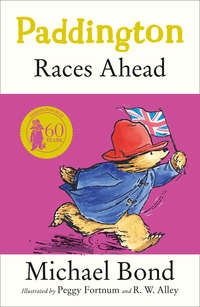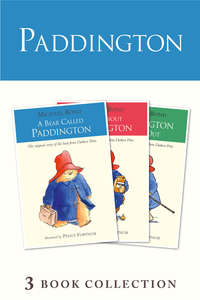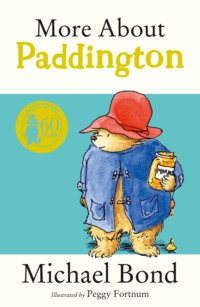
Полная версия
Paddington Complete Novels
“I bet mine was bigger than anyone else’s,” he said, sleepily.
“Bet you mine was the biggest,” said Jonathan.
“I think,” said Mr Brown, hastily, “you’d all better have a pound just to make sure.”
“Perhaps we can come again another day,” said Mrs Brown. “Then we can have another competition. How about that, Paddington?”
There was no reply from the back of the car. Sand-castles, paddling his bucket all across the harbour, and the sea air had proved too much for Paddington. He was fast asleep.
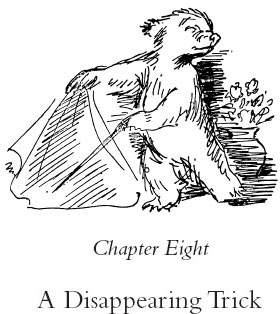
“OOOH,” SAID PADDINGTON, “is it really for me?” He stared hungrily at the cake. It really was a wonderful cake. One of Mrs Bird’s best. It was covered with sugar icing and it had a cream and marmalade filling. On the top there was one candle and the words: TO PADDINGTON. WITH BEST WISHES FOR A HAPPY BIRTHDAY – FROM EVERYONE.
It had been Mrs Bird’s idea to have a birthday party. Paddington had been with them for two months. No one, not even Paddington, knew quite how old he was, so they decided to start again and call him one. Paddington thought this was a good idea, especially when he was told that bears had two birthdays every year – one in the summer and one in the winter.
“Just like the Queen,” said Mrs Bird. “So you ought to consider yourself very important.”
Paddington did. In fact, he went round to Mr Gruber straight away and told him the good news. Mr Gruber looked impressed and was pleased when Paddington invited him to the party.
“It’s not often anyone invites me out, Mr Brown,” he said. “I don’t know when I went out last and I shall look forward to it very much indeed.”
He didn’t say any more at the time, but the next morning a van drew up outside the Browns’ house and delivered a mysterious-looking parcel from all the shopkeepers in the Portobello Market.
“Aren’t you a lucky bear,” exclaimed Mrs Brown, when they opened the parcel and saw what was inside. It was a nice new shopping basket on wheels, with a bell on the side that Paddington could ring to let people know he was coming.
Paddington scratched his head. “It’s a job to know what to do first,” he said, as he carefully placed the basket with the other presents. “I shall have a lot of ‘thank you’ letters to write.”
“Perhaps you’d better leave them until tomorrow,” said Mrs Brown hastily. Whenever Paddington wrote any letters he generally managed to get more ink on himself than on the paper, and he was looking so unusually smart, having had a bath the night before, that it seemed a pity to spoil it.
Paddington looked disappointed. He liked writing letters. “Perhaps I can help Mrs Bird in the kitchen,” he said hopefully.
“I’m glad to say,” said Mrs Bird, as she emerged from the kitchen, “that I’ve just finished. But you can lick the spoon if you like.” She had bitter memories of other occasions when Paddington had ‘helped’ in the kitchen. “But not too much,” she warned, “or you won’t have room for this.”
It was then that Paddington saw his cake for the first time. His eyes, usually large and round, became so much larger and rounder, that even Mrs Bird blushed with pride. “Special occasions demand special things,” she said, and hurried off in the direction of the dining-room.
Paddington spent the rest of the day being hurried from one part of the house to another as preparations were made for his party. Mrs Brown was busy tidying up. Mrs Bird was busy in the kitchen. Jonathan and Judy were busy with the decorations. Everyone had a job except Paddington.
“I thought it was supposed to be my birthday,” he grumbled, as he was sent packing into the drawing-room for the fifth time after upsetting a box of marbles over the kitchen floor.
“So it is, dear,” said a flustered Mrs Brown. “But your time comes later.” She was beginning to regret telling him that bears had two birthdays every year, for already he was worrying about when the next one was due.
“Now just you watch out of the window for the postman,” she said, lifting him up on to the window-sill. But Paddington didn’t seem very keen on this. “Or else,” she said, “practise doing some of your conjuring tricks, ready for this evening.”
Among Paddington’s many presents was a conjuring outfit from Mr and Mrs Brown. It was a very expensive one from Barkridges. It had a special magic table, a large mystery box which made things disappear if you followed the instructions properly, a magic wand and several packs of cards. Paddington emptied them all over the floor and settled down in the middle to read the book of instructions.
He sat there for a long time, studying the pictures and diagrams, and reading everything twice to make sure. Every now and then he absent-mindedly dipped a paw into his marmalade pot, and then, remembering it was his birthday and that there was a big tea to come, he reached up and stood the jar on the magic table before returning to his studies.
The first chapter was called SPELLS. It showed how to wave the magic wand and the correct way to say ABRACADABRA. Paddington stood up clutching the book in one paw, and waved the wand several times through the air. He also tried saying ABRACADABRA. He looked round. Nothing seemed to have changed, and he was just about to try again, when his eyes nearly popped out of his head. The jar of marmalade which he’d placed on the magic table only a few minutes before had disappeared!
He searched hurriedly through the book. There was nothing about making marmalade disappear. Worse still, there was nothing about making it come back again, either. Paddington decided it must be a very powerful spell to make a whole pot vanish into thin air.
He was about to rush outside and tell the others when he thought better of it. It might be a good trick to do in the evening, especially if he could persuade Mrs Bird to give him another jar. He went out into the kitchen and waved his wand a few times in Mrs Bird’s direction, just to make sure.
“I’ll give you ABRACADABRA,” said Mrs Bird, pushing him out again. “And be careful with that stick or you’ll have someone’s eye out.”
Paddington returned to the drawing-room and tried saying his spell backwards. Nothing happened, so he started reading the next chapter of the instruction book, which was called THE MYSTERY OF THE DISAPPEARING EGG.
“I shouldn’t have thought you needed any book to tell you that,” said Mrs Bird at lunch time, as Paddington told them all about it. “The way you gobble your food is nobody’s business.”
“Well,” said Mr Brown, “so long as you don’t try sawing anyone in half this evening, I don’t mind.”
“I was only joking,” he added hurriedly, as Paddington turned an inquiring gaze on him. Nevertheless, as soon as lunch was over, Mr Brown hurried down the garden and locked up his tools. With Paddington there was no sense in taking chances.
As it happened he had no cause to worry, for Paddington had far too many things on his mind what with one thing and another. The whole family was there for tea as well as Mr Gruber. Several other people came along too, including the Browns’ next door neighbour, Mr Curry. The last named was a most unwelcome visitor. “Just because there’s a free tea,” said Mrs Bird. “I think it’s disgusting, taking the crumbs off a young bear’s plate like that. He’s not even been invited!”
“He’ll have to look slippy if he gets any crumbs off Paddington’s plate,” said Mr Brown. “All the same, it is a bit thick, after all the things he’s said in the past. And not even bothering to wish him many happy returns.”
Mr Curry had a reputation in the neighbourhood for meanness and for poking his nose into other people’s business. He was also very bad-tempered, and was always complaining about the least little thing which met with his disapproval. In the past that had often included Paddington, which was why the Browns had not invited him to the party.
But even Mr Curry had no cause to complain about the tea. From the huge birthday cake down to the last marmalade sandwich, everyone voted it was the best tea they had ever had. Paddington himself was so full he had great difficulty in mustering enough breath to blow out the candle. But at last he managed it without singeing his whiskers, and everyone, including Mr Curry, applauded and wished him a happy birthday.
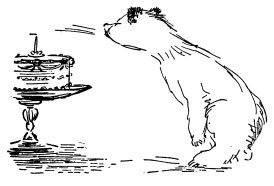
“And now,” said Mr Brown, when the noise had died down. “If you’ll all move your seats back, I think Paddington has a surprise for us.”
While everyone was busy moving their seats to one side of the room, Paddington disappeared into the drawing-room and returned carrying his conjuring outfit. There was a short delay while he erected his magic table and adjusted the mystery box, but soon all was ready. The lights were turned off except for a standard lamp and Paddington waved his wand for quiet.
“Ladies and gentlemen,” he began, consulting his instruction book, “my next trick is impossible!”
“But you haven’t done one yet,” grumbled Mr Curry.
Ignoring the remark, Paddington turned over the page.”For this trick,” he said, “I shall require an egg.”
“Oh dear,” said Mrs Bird, as she hurried out to the kitchen, “I know something dreadful is going to happen.”
Paddington placed the egg in the centre of his magic table and covered it with a handkerchief. He muttered ABRACADABRA several times and then hit the handkerchief with his wand.
Mr and Mrs Brown looked at each other. They were both thinking of their carpet. “Hey presto!” said Paddington, and pulled the handkerchief away. To everyone’s surprise the egg had completely disappeared.
“Of course,” said Mr Curry, knowledgeably, above the applause, “it’s all done by sleight of paw. But very good though, for a bear. Very good indeed. Now make it come back again!”
Feeling very pleased with himself, Paddington took his bow and then felt in the secret compartment behind the table. To his surprise he found something much larger than an egg. In fact… it was a jar of marmalade. It was the one that had disappeared that very morning! He displayed it in his paw; the applause for this trick was even louder.
“Excellent,” said Mr Curry, slapping his knee. “Making people think he was going to find an egg, and it was a jar of marmalade all the time. Very good indeed!”
Paddington turned over a page. “And now,” he announced, flushed with success, “the disappearing trick!” He took a bowl of Mrs Brown’s best flowers and placed them on the dining-table alongside his mystery box. He wasn’t very happy about this trick, as he hadn’t had time to practise it, and he wasn’t at all sure how the mystery box worked or even where you put the flowers to make them disappear.
He opened the door in the back of the box and then poked his head round the side. “I shan’t be a minute,” he said, and then disappeared from view again.
The audience sat in silence. “Rather a slow trick, this one,” said Mr Curry, after a while.
“I hope he’s all right,” said Mrs Brown. “He seems very quiet.”
“Well, he can’t have gone far,” said Mr Curry. “Let’s try knocking.” He got up, knocked loudly on the box, and then put his ear to it. “I can hear someone calling,” he said. “It sounds like Paddington. I’ll try again.” He shook the box and there was an answering thump from inside.
“I think he’s shut himself in,” said Mr Gruber. He too knocked on the box and called out, “Are you all right, Mr Brown?”
“NO!” said a small and muffled voice. “It’s dark and I can’t read my instruction book.”
“Quite a good trick,” said Mr Curry, some while later after they had prised open Paddington’s mystery box with a penknife. He helped himself to some biscuits. “The disappearing bear. Very unusual! But I still don’t see what the flowers were for.”
Paddington looked at him suspiciously, but Mr Curry was far too busy with the biscuits.
“For my next trick,” said Paddington, “I would like a watch.”
“Are you sure?” asked Mrs Brown, anxiously. “Wouldn’t anything else do?”
Paddington consulted his instruction book. “It says a watch,” he said, firmly.
Mr Brown hurriedly pulled his sleeve down over his left wrist. Unfortunately, Mr Curry, who was in an unusually good mood after his free tea, stood up and offered his. Paddington took it gratefully and placed it on the table. “This is a jolly good trick,” he said, reaching down into his box and pulling out a small hammer.
He covered the watch with a handkerchief and then hit it several times. Mr Curry’s expression froze. “I hope you know what you’re doing, young bear,” he said.
Paddington looked rather worried. Having turned over the page he’d just read the ominous words, “It is necessary to have a second watch for this trick.” Gingerly, he lifted up a corner of the handkerchief. Several cogs and some pieces of glass rolled across the table. Mr Curry let out a roar of wrath.
“I think I forgot to say ABRACADABRA,” faltered Paddington.
“ABRACADABRA!” shouted Mr Curry, beside himself with rage. “ABRACADABRA!” He held up the remains of his watch. “Twenty years I’ve had this watch, and now look at it! This will cost someone a pretty penny!”
Mr Gruber took out an eyeglass and examined the watch carefully. “Nonsense,” he said, coming to Paddington’s rescue. “It’s one you bought from me for three pounds six months ago! You ought to be ashamed of yourself, telling lies in front of a young bear!”
“Rubbish!” spluttered Mr Curry. He sat down heavily on Paddington’s chair. “Rubbish! I’ll give you…” his voice trailed away and a peculiar expression came over his face. “I’m sitting on something,” he said. “Something wet and sticky!”
“Oh dear,” said Paddington. “I expect it’s my disappearing egg. It must have reappeared!”
Mr Curry grew purple in the face. “I’ve never been so insulted in my life,” he said. “Never!” He turned at the door and waved an accusing finger at the company. “It’s the last time I shall ever come to one of your birthday parties!”
“Henry,” said Mrs Brown, as the door closed behind Mr Curry, “you really oughtn’t to laugh.”
Mr Brown tried hard to keep a straight face. “It’s no good,” he said, bursting out. “I can’t help it.”
“Did you see his face when all the cogs rolled out?” said Mr Gruber, his face wet with tears.
“All the same,” said Mr Brown, when the laughter had died down. “I think perhaps you ought to try something a little less dangerous next time, Paddington.”
“How about that card trick you were telling me about, Mr Brown?” asked Mr Gruber. “The one where you tear up a card and make it come out of someone’s ear.”
“Yes, that sounds a nice quiet one,” said Mrs Brown. “Let’s see that.”
“You wouldn’t like another disappearing trick?” asked Paddington, hopefully.
“Quite sure, dear,” said Mrs Brown.
“Well,” said Paddington, rummaging in his box, “it’s not very easy doing card tricks when you’ve only got paws, but I don’t mind trying.”
He offered a pack of cards to Mr Gruber, who solemnly took one from the middle and then memorised it before replacing the card. Paddington waved his wand over the pack several times and then withdrew a card. He held up the seven of spades. “Was this it?” he said to Mr Gruber.
Mr Gruber polished his glasses and stared. “You know,” he said, “I do believe it was!”
“I bet all the cards are the same,” whispered Mr Brown to his wife.
“Ssh!” said Mrs Brown. “I thought he did it very well.”
“This is the difficult bit,” said Paddington, tearing it up. “I’m not very sure about this part.” He put the pieces under his handkerchief and tapped them several times with the wand.
“Oh!” said Mr Gruber, rubbing the side of his head. “I felt something go pop in my ear just then. Something cold and hard.” He felt in his ear. “Why I do believe…” He held up a shining round object to the audience. “It’s a sovereign! My birthday present for Paddington! Now I wonder how it got in there?”
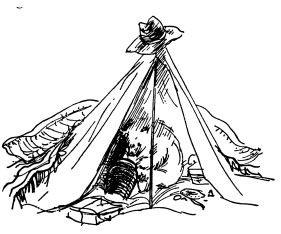
“Oooh!” said Paddington, as he proudly examined it. “I didn’t expect that. Thank you very much, Mr Gruber.”
“Well,” said Mr Gruber. “It’s only a small present I’m afraid, Mr Brown. But I’ve enjoyed the little chats we’ve had in the mornings. I look forward to them very much and, er,” he cleared his throat and looked around, “I’m sure we all hope you have many more birthdays!”
When the chorus of agreement had died down, Mr Brown rose and looked at the clock. “And now,” he said, “it’s long past all our bedtimes, most of all yours, Paddington, so I suggest we all do a disappearing trick now.”
“I wish,” said Paddington, as he stood at the door waving everyone goodbye, “I wish my Aunt Lucy could see me now. She’d feel very pleased.”
“You’ll have to write and tell her all about it, Paddington,” said Mrs Brown, as she took his paw. “But in the morning,” she added hastily. “You’ve got clean sheets, remember.”
“Yes,” said Paddington. “In the morning. I expect if I did it now I’d get ink over the sheets or something. Things are always happening to me.”
“You know, Henry,” said Mrs Brown, as they watched Paddington go up the stairs to bed, looking rather sticky and more than a little sleepy, “it’s nice having a bear about the house.”
Postscript
A Bear Called Paddington didn’t begin life as a book. The opening paragraph was simply an early-morning doodle brought on by the certain knowledge that if I didn’t put something down on the blank sheet of paper in my typewriter nobody else would.
However, it caught my fancy, so I wrote a second paragraph, then a third, until by the end of the day I had completed a whole story.
The source of my inspiration was a toy bear sitting on the mantelpiece of our one-room flat near London’s Portobello market. I had bought it in desperation the previous Christmas Eve as a stocking-filler for my wife, and we called him Paddington because I had always liked the sound of it and names are important, particularly if you are a bear and don’t have very much else in the world.
In no time at all he became part of the family. In fact, for a long time he was the family and was treated as such; joining us at meal times, sharing our holidays, occasionally interrupting our conversations.
Ten working days later, having completed seven more stories, I realised I had a book on my hands. It hadn’t been written with any particular age group in mind, which was fortunate, because until then I had always written for adults and if I had consciously aimed at a young audience I might have ‘written down’, which is always a bad idea. Anyway, I agree with Gertrude Stein: a book is a book is a book, and it should be enjoyable on all levels.
It was lucky, too, that I picked on a bear for my doodling. The late Peter Bull, actor and arctophile, once said that whereas dolls are always wondering what they are going to wear next, you never know quite what bears are thinking, and he was right. You feel you can trust them with your secrets and they won’t pass them on. Another thing about bears is that one perceives them in the wild lumbering around on two legs, so they are already halfway to being human.
The first book in a series is always the most fun to write. The world is your oyster and you can go wherever your fancy takes you. However, at the same time you build in certain parameters which are there for all time. Although Paddington’s adventures take place in the present, I always picture him going home at the end of the day to the rather safer pre-war world which I remember from my childhood.
I don’t think they ever realised it, but my parents served as role models for Mr and Mrs Brown. (There is also a lot of my father in Paddington, for he was very law-abiding and never went out without a hat in case he bumped into someone he knew and had nothing to raise.) Jonathan and Judy were there to bridge the age gap. Mrs Bird was based on memories of my childhood best friend’s live-in nanny. Paddington’s ‘best friend’, Mr Gruber, is important because he knows what it is like to be a refugee in a strange country, so they have a special relationship. The Browns’ long-suffering next-door neighbour, Mr Curry, triggers off many a story. I have only to put the two together and things start to happen. ‘Number 32 Windsor Gardens’ I saw as being just around the corner from our flat.
Paddington was, and always will be, very real to me. He has his feet firmly on the ground and he has a very strong sense of right and wrong. So much so that when I come up against a problem in my own life I often ask myself what he would do.
The fact that others believe in him just as much is rewarding. For example, the boy who wrote saying he was so used to Paddington being the name of a bear it now seemed a funny name for a station. And the nun who wrote to me out of the blue telling me she was in hospital – I suspect suffering from an incurable disease – and thanking me for all the comfort Paddington brought her. He couldn’t have had a greater compliment paid him.
Writing comedy is a serious business; a matter of distillation, of finding exactly the right word. On the whole, without the benefit of an immediate audience response, one works in a kind of vacuum.
However, I did once find myself sitting in a restaurant and overhearing two men in the next booth discussing Paddington’s exploits. They were both laughing their heads off, and that was very satisfying because in the circumstances it was obviously genuine. I didn’t let on I was there for fear of embarrassing both parties.
Then, some years ago, on a promotional tour in Australia, I had to carry a stuffed Paddington everywhere I went. Each time I boarded a plane I knew it wouldn’t be long before he would be asked up to the flight deck. On one occasion I left him up there, strapped into a spare bucket seat while the crew explained the controls. A little later on I received a second message asking if I would mind him staying up there because he wanted to practise landing the plane. I didn’t tell the other passengers!
When I wrote the first book I had no idea that he would eventually be honoured with a life-size bronze statue on the station itself. People use the plinth to sit on while they eat their sandwiches, which is rather apposite really, and it’s nice to think they will probably still be doing it long after I have gone.
I don’t suppose we shall ever meet, but if we do I shan’t be at all surprised. Being a polite bear I’m sure he will raise his hat, and as we go our separate ways I shall regret not wearing one too, so that I could raise it in return as a mark of respect.
MICHAEL BOND
April 2001


Contents
Title Page
Chapter 1
Chapter 2
Chapter 3
Chapter 4
Chapter 5
Chapter 6
Chapter 7
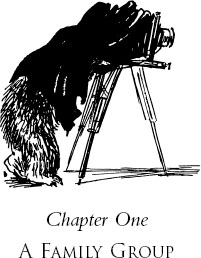
The Browns’ house at number thirty-two Windsor Gardens was unusually quiet. It was a warm summer day and all the family with the exception of Paddington, who had mysteriously disappeared shortly after lunch, were sitting on the veranda enjoying the afternoon sun.


